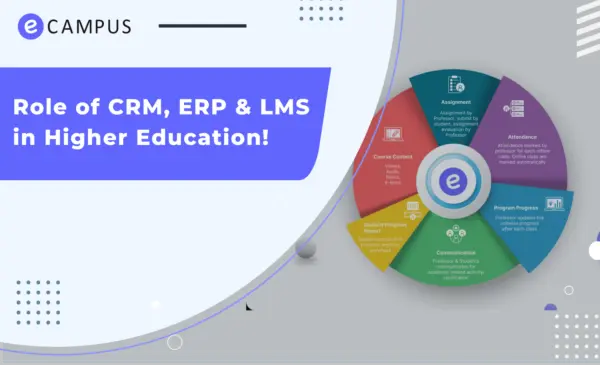Role of CRM, ERP & LMS in Higher Education!
Becoming digital in the education industry is quickly becoming a must-have strategy for staying competitive. The vast majority of the world’s most prestigious institutions have already completed a full digital transformation of their operations. From admission through graduation, they oversee the entire student life cycle. Because of the CRM, ERP, and LMS, it is easier for institutions to run their institute remotely, continue student lear.
How can you assist more students in receiving the quality education they deserve?
Well, for that, you must establish an impeccable process and comprehend your student’s true expectations. Your admissions team must contact students who have made inquiries as soon as possible and assist in setting up effective classrooms for students and managing the business workflow at colleges and universities. To do that efficiently, CRM, ERP, and LMS in higher education are must-have assets…
CRM, ERP, and LMS in higher education—Explained
-
- CRM in Higher Education
Customer relationship management (CRM) software can help you manage all of your student inquiries. It guides your students through a smooth and efficient admissions procedure. CRM’s overarching purpose is to develop a strong relationship between the student and the institution, which is currently lacking. We can also say CRM in higher education captures all student inquiries.
When it comes to admissions, there are a lot of questions, and your admissions team may miss a couple. In such cases, CRM ensures that no leads are lost. The CRM will automatically capture every student inquiry. As a result, you will never again miss a lead. It will also assist you in engaging your students more effectively.
The CRM software comes to your rescue and assists your staff in keeping in touch with students by providing them with engaging information at regular intervals. After relevant triggers, the platform automatically tells them about their campus visits, required onboarding paperwork, and more.
-
- ERP in Higher Education
All educational leaders want complete control over their organization. They want to be aware of and up to date on all ongoing activities, expenses, employee records, student outcomes, institutional effectiveness, and so on. ERP is a solution that provides everything an educator needs to manage their institute effectively and efficiently.
To deliver the required results and improve transparency and operational efficiency for higher education institutions. It provides a centralised database with multiple modules through which the admin user can keep track of day-to-day tasks. The user can manage, monitor, and control the entire administrative process from a single platform.
Universities and colleges require end-to-end ERP software to record, maintain, organise, and manage the admission process, student enrollment, accounting, online assessments & examinations, purchases, and so on…
Education institutions must select an ERP system that should assist them in implementing digital transformation and automation in their institutions, thereby simplifying all academic and administrative operations.
-
- LMS for Higher Education
Many higher-educational institutions now use advanced learning management systems (LMS) to implement effective learning processes and manage educational workflow. By The The LMS assists higher-educational institutions in establishing effective classrooms by bridging the gap between online digital learning and instructor-led training. The latest learning management systems allow students to attend classes and lectures online according to a predetermined schedule.
The Importance of Learning Management Systems in Higher Education:
1. Enabling Remote Learning
2. Creating Comprehensive and Engaging Content
3. Requiring teachers to concentrate solely on teaching;
4. Tracking Student Performance and Goals
5. Introducing Blended Learning
6. Discussion-Based Learning
7. Making Learning Process Management Easier
8. Lowering the Cost of Higher Education
In higher education, the value of a learning management system can be measured by looking at both conventional and unique use cases. Higher-educational institutions can use next-generation learning management systems to streamline the learning process and create digital libraries. Schools and colleges may easily launch new courses and manage multiple courses thanks to the LMS’s connectivity with digital libraries.
Conclusion:
Higher education institutions (HEIs) are undergoing significant changes in how they operate and interact with their “customers,” who include students, parents, alumni, employers, and employees. Higher education clients are demanding more attention and immediate service, so proactive institutions are turning to technology to meet their demands. Hence, CRM, ERP, and LMS come into play and help with better and more effective workflow in higher educational institutions.



Leave a Reply